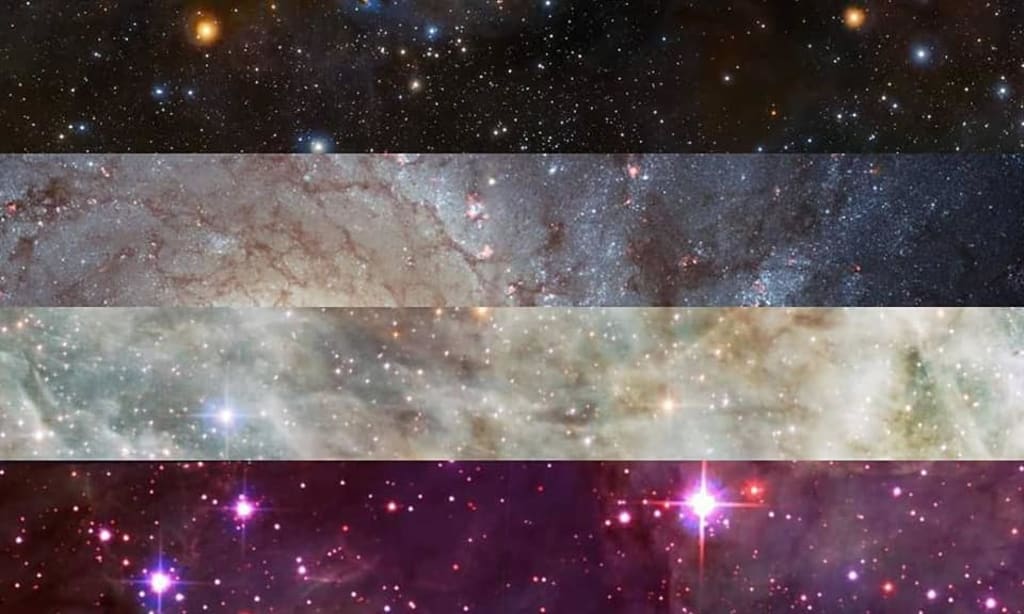A Little Rumi: VENUS VALLEY Looks East (part 3)
Queer Philosophers’ Forum, pt. 10

“The universe is not outside of you. Look inside yourself. Everything you want, you already are.”
Welcome to our next-to-last glance east, queerly beloveds. If this is your first time here and you’re not caught up with what I’m up to, it’s this: chapter by chapter, my LGBTQIA+ centric philosophy book-in-progress will be offered to you my, rainbow flag flying community, to debate, discuss, question, contribute, so your inputs become my edits, until the finished book has all our voices in it together. Welcome to a contemplative corner of Venus Valley - Queer Philosophers’ Forum.
(To have a peek at our visits east so far, click HERE and HERE… And for my deep dive into why I’m spending this many chapters shining the spotlight on the East’s influence on the West, to repay the debt of disrespect the West showed the East, grab a comfort snack and click HERE.)
As if it wasn’t a confusing and frustrating enough subject already, in philosophy there are two ideas both called PRESENTISM; and I might be about to indulge in one of them. Not the one that’s a brain-bending perspective of space and time that says the past and future don’t exist, there is only the single moment; I might save that for my upcoming chapter on Star Trek. I’m talking about the one that judges past cultures by present day standards, or pushes present day ideas onto figures in history.
Persian preacher-poet Jelalludin Rumi, if I might be forgiven for giving the western spelling of his name, who gets centre stage in today’s chapter, might not have claimed either of these identities for himself; but he’s a figure in philosophy that I thought my homosexual and asexual-spectrum readers - or the Gays & the Grays, as I like to call you beautiful people - would feel seen, if I shine the spotlight on him, and what he had in common with them, just for a few paragraphs.
“Neither Christian, Jew, Zoroastrian or Muslim am I; I am not an easterner or a westerner, or of land or sea…”
Rumi, according to his modern-day translator E. Whinfield, led the quiet life of an Islamic teacher in 13th-century Anatolia (Turkey) til he was well into his 30s; when he met a man, a wandering DERVISH - a sect who sought to experience ecstatic divine presence through poetry and dance (some of it pretty intensely erotic!) - named Shams Tabriz - “through whom he encountered the Divine Presence in a way that utterly transformed him.” Shams was “The Friend”, “The Beloved”, “The Sun of Tabriz”; and all through the book of prayers, parables and poetry that Rumi came out with after the inspiration that struck when he met him - the Masnavi - a massively important and transformational work for the SUFI sect - a mystical meditative fringe branch of Islam - these lines of love repeat, as images of the reunion of the outer body with the inner soul, and the inner soul with the divine source. One man loving another man like a lover - but in a passion of soul and spirit, not of animal attraction - was like the connection with God; and our connection with God, is like the loyal devotion of a lover. Love is reunion from separation. “True love is not body desiring union with body, but soul with soul.”
Now it might be one of those books whose bad bits have to be written off with the old one-size-fits-all “it was a product of its time”; Jewish and Hindu characters in the stories are either the fool, or the villain, a bit more often than strictly necessary; and woman - despite being “a ray of God, not a mere creature” - is either called distraction, or destruction, to the solitary spiritual life, a lot more often than strictly necessary! But it’s still a world renowned work of devotional philosophy written by (to indulge in a bit of Presentism by giving today’s labels to yesterday’s identities) an asexual gay man.
Let’s take a look.
Book I opens with The Tale of the Reed Flute, a metaphor for the soul's yearning for its original divine home. The reed flute laments its separation from the reed bed and symbolizes the human longing for reunion with God. Then in the story of the Sultan his spiritual advisor advises him on matters of the heart and soul.
Is it more important to seek truth and inner knowledge? Are the pleasures of the world just fleeting illusions?
Book II’s story is The Lion, the Hare, and the Well, a metaphor for the quest for spiritual awakening. The lion is the powerful and courageous soul, the hare the ego, and the well the source of divine knowledge.
Do we need to confront and overcome the ego's limitations, to access the wisdom within?
Book III, with the story of a king who falls in love with a beautiful slave girl, explores the nature of desire and the longing for union with the Divine.
Rumi’s "Seven Valleys," from Sufi teaching, represent stages of spiritual evolution and challenges on the path to enlightenment, the qualities and inner transformations required to progress on the spiritual journey.
Do all desires stem from the soul's yearning for its true origin? Is the satisfaction of worldly desires fleeting, compared to eternal fulfillment found in spiritual union with God?
Book IV’s Prophet Musa is Moses, for the benefit of my non-Islamic readers; his encounter with the shepherd Khidr, explores the concept of the spiritual guide.
Is it important to surrender to the wisdom and guidance of a master? Does true knowledge and enlightenment come through direct experiences and encounters with those who possess divine wisdom?
Book V‘s story, about the Prophet of Islam Whose Name I Won’t Print Here Out of Respect, and his ascent through the heavenly realms during ”The Night Journey”, explores realms of spiritual ascent and stages of mystical experience.
Is spiritual vision important? What about the ability to perceive truths beyond the limitations of the physical world?
Book VI, The Niche of Lights, you won’t be surprised to hear, explores illumination: light as the essence of God; the transformative power of divine light; the human soul a receptacle for, a vessel for, divine illumination.
The Greeks Aristotle, Plato, Socrates, Diogenes, Pythagoras; the Persian Avicenna; the Indian Aryabhata; and all the other philosophers and schools of philosophy Rumi critiques, have pretty much made it second nature for us to talk about the love of wisdom (literal PHILO-SOPHIA) in picturesque language of light, even when we don’t realise we’re doing it: “You’re really BRIGHT; you’re a real VISIONARY; can you ENLIGHTEN me? Can you make it CLEARER? Ah, I SEE! That’s really ILLUMINATING!”
At the end of the book we finally get to read Rumi exploring the Sufi’s and the Dervish’s core experience; which is… well… experience. If you’re like me and you absolutely love the absurdly-yet-profoundly queer-coded Good Omens by Terry Pratchett & Neil Gaiman (and just so we’re clear: if you don’t, then you’re wrong - those two are as good philosophers as anyone in this whole book and a heck of a lot funnier than most of them), then you know the word Ineffable: it means beyond expressing. So, say Sufis like Rumi and Dervishes like his beloved Shams, if the divine is beyond all expression, then it can’t just be explained; it has to be explored; and that experience itself would be just as much beyond expression: spiritual ecstasy and intoxication, where the seeker becomes consumed by intense overwhelming divine love and loses self-awareness. Desirable and transformative experience that enables the seeker to transcend worldly concerns.
And that’s the core of the concept of the book, and of Rumi and Shams: “living for God” isn’t about law, it’s about love. I get so tired on behalf of all the homosexual and asexual-spectrum men I see - my lovely Gays & Grays - wishing people could understand that homosexuality and the asexuality spectrum aren’t deformities of sexuality; just different kinds of love, and if we only knew how many kinds of love there were, what a spectrum, what a rainbow flag, it is, would there really be any reason or need to live by a law that would condemn any of them?
Your outer self reuniting with your inner self; your inner self reaching out to another’s inner self, regardless of the outer; both of you together living in a mutual love of God - whatever you explain or experience God to be. Love as the driving force behind spiritual growth. The love that exists between the seeker and the sought. Unwavering devotion. The intensity of longing, the pain of separation, and the ecstasy of union with the Beloved. From the initial attraction to the Beloved to the ultimate state of annihilation in divine love. Love that dissolves the ego and unites the lover with the Beloved. They’re all just love.
And last but not least:
Rumi’s idea that the soul is a divine spark temporarily residing in the physical form; the ultimate goal to transcend the limitations of the body and merge with the eternal essence; the illusion of the material world; to see beyond the superficial appearances of the physical realm and recognize the underlying divine presence; the soul's yearning for reunion with God; that the soul is on a perpetual quest to remember its divine origin and seeks to return to its rightful place of unity with the divine; transcend the boundaries of the self and experience the unity of all creation; is pretty much in tune with the GNOSTIC way of thinking that got a passing mention in my Queer Roman History & Mystery chapter (which you can skip back to read by clicking HERE). A way of thinking that, among others, influenced and inspired Carl Jung, who we’re kind of getting to meet in the next chapter, coming soon!
P.S. -
Rumi was also all about spiritual poverty, renouncing worldly attachments, detachment from material possessions, letting go of worldly desires; so before you get too deeply into him, don’t forget being a bit playful and passionate can feel pretty divine, too…
~*~
To subscribe so you get to see the end of our journey east as soon as it arrives, fresh from my C.F.S.-addled queer-philosophy-loving brain, click HERE;
To join the bookface group where we can debate, discuss, question, contribute, click HERE;
And to be kind and generous enough to leave a donation, big or small, to help this blog become a fully born book baby, click HERE.
~*~
About the Creator
Mx. Stevie (or Stephen) Cole
Genderfluid
Socialist
Actor/actress
Tarot reader
Attracted to magic both practical & impractical
Writer of short stories and philosophical musings






Comments (2)
For a long time now I have distilled the gospel message into three simple propositions: 1. God loves you & there's nothing you can do about it. 2. God's grace is always for you. 3. (This is about discipleship). All that God asks or hopes from us is that we afford one another these same courtesies God has afforded us. I become thoroughly exasperated with Christians who insist that homosexuality is condemned in Romans 1 when the clear message of Romans 1-2 is do not judge one another. The insistence upon ending the passage right before Paul declares "Therefore," is confounding to me. Why would anyone want to believe they understand his point before he makes it?
This is fantastic! And yes, different ways to love! 💙♥️🧡🤎🩵💖💚❤️🩷🖤🤎❤️🩹🩷💕